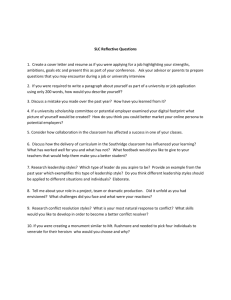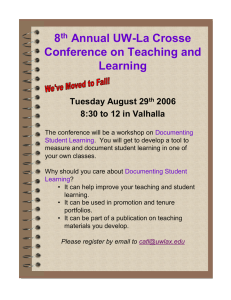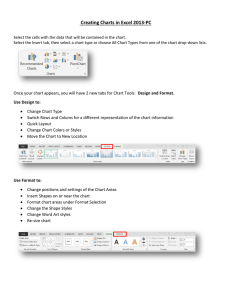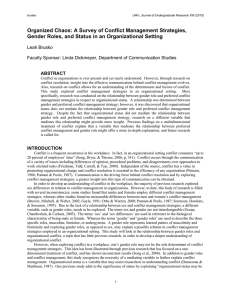UW-La Crosse 3 Annual Teaching Conference January 22, 2002
advertisement
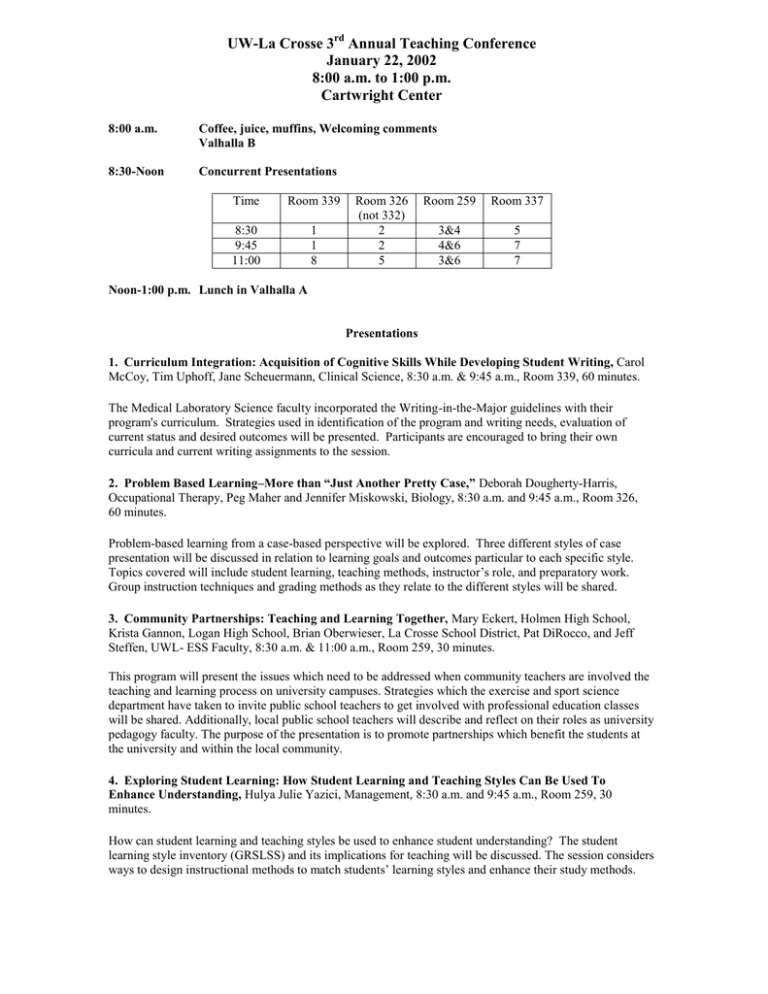
UW-La Crosse 3rd Annual Teaching Conference January 22, 2002 8:00 a.m. to 1:00 p.m. Cartwright Center 8:00 a.m. Coffee, juice, muffins, Welcoming comments Valhalla B 8:30-Noon Concurrent Presentations Time Room 339 8:30 9:45 11:00 1 1 8 Room 326 (not 332) 2 2 5 Room 259 Room 337 3&4 4&6 3&6 5 7 7 Noon-1:00 p.m. Lunch in Valhalla A Presentations 1. Curriculum Integration: Acquisition of Cognitive Skills While Developing Student Writing, Carol McCoy, Tim Uphoff, Jane Scheuermann, Clinical Science, 8:30 a.m. & 9:45 a.m., Room 339, 60 minutes. The Medical Laboratory Science faculty incorporated the Writing-in-the-Major guidelines with their program's curriculum. Strategies used in identification of the program and writing needs, evaluation of current status and desired outcomes will be presented. Participants are encouraged to bring their own curricula and current writing assignments to the session. 2. Problem Based Learning–More than “Just Another Pretty Case,” Deborah Dougherty-Harris, Occupational Therapy, Peg Maher and Jennifer Miskowski, Biology, 8:30 a.m. and 9:45 a.m., Room 326, 60 minutes. Problem-based learning from a case-based perspective will be explored. Three different styles of case presentation will be discussed in relation to learning goals and outcomes particular to each specific style. Topics covered will include student learning, teaching methods, instructor’s role, and preparatory work. Group instruction techniques and grading methods as they relate to the different styles will be shared. 3. Community Partnerships: Teaching and Learning Together, Mary Eckert, Holmen High School, Krista Gannon, Logan High School, Brian Oberwieser, La Crosse School District, Pat DiRocco, and Jeff Steffen, UWL- ESS Faculty, 8:30 a.m. & 11:00 a.m., Room 259, 30 minutes. This program will present the issues which need to be addressed when community teachers are involved the teaching and learning process on university campuses. Strategies which the exercise and sport science department have taken to invite public school teachers to get involved with professional education classes will be shared. Additionally, local public school teachers will describe and reflect on their roles as university pedagogy faculty. The purpose of the presentation is to promote partnerships which benefit the students at the university and within the local community. 4. Exploring Student Learning: How Student Learning and Teaching Styles Can Be Used To Enhance Understanding, Hulya Julie Yazici, Management, 8:30 a.m. and 9:45 a.m., Room 259, 30 minutes. How can student learning and teaching styles be used to enhance student understanding? The student learning style inventory (GRSLSS) and its implications for teaching will be discussed. The session considers ways to design instructional methods to match students’ learning styles and enhance their study methods. 5. Teaching Sensitive Topics in the Classroom, Cheri Niedzwiecki, Communication Studies, Sandi Krajewski, Women’s Studies, Al Gedicks, Sociology/Archaeology, June Reinert, Disability Resource Services, Carmen Van Voorhis, Psychology, 8:30 a.m., Room 337, and 11:00 a.m., Room 326, 60 minutes. This panel is designed to help faculty and instructors who teach sensitive topics such as gender, race, disabilities and sexual orientation learn better techniques for discussing these topics in the classroom. This presentation should help faculty from many different disciplines who teach courses with sensitive topics. 6. Learning Strategies: Tools for Strategic Learning, Barbara Eide, Accountancy, and Kenneth Winter, College of Business Administration, 9:45 a.m. and 11:00 a.m., Room 259, 30 minutes. Learning strategies are useful tools and techniques to prepare students for a lifetime of learning. These strategies are not discipline specific, so they can be of benefit to students from all disciplines. We will discuss the results of our integration of learning strategies in accounting courses. Also we are interested in learning whether others have integrated these strategies in their courses and with what results. 7. Using Concept Mapping to Enhance Understanding, Terry Beck and Bryan Kopp, English Department, 9:45 a.m. and 11:00 a.m., Room 337, 60 minutes. This presentation will demonstrate how to use concept mapping: an approach to critical thinking/informal writing done with either pencil and paper or special computer freeware. Concept mapping can be used by students 1) to enhance their ability to read critically, 2) to systematize and deepen an analysis, 3) to plan a piece of writing, 4) to construct a peer review. Faculty may also find it useful in their own intellectual work and as an assessment of student understanding. 8. Forum on Grade Inflation, Aaron Monte, Chemistry, Donna Anderson, Economics, and Tom Hench, Management, 11:00 a.m., Room 339, 60 minutes. A brief introduction to the phenomenon of grade inflation will be presented with supporting data and notable actions being taken on other campuses to curtail this trend. Discussion and debate exploring several facets of the issue and what we might do about inflated grades at UW-L will ensue.
